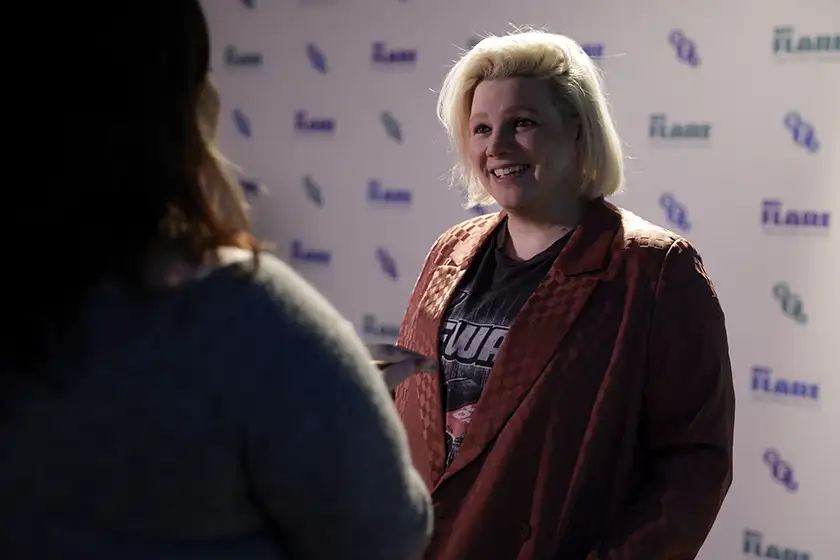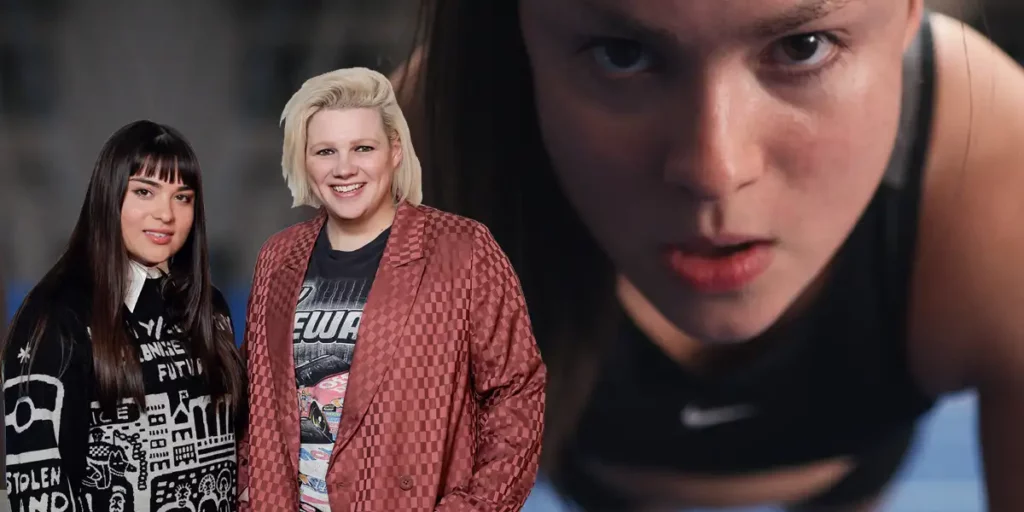At the BFI Flare gala screening of Backspot, we interview actress-producer Devery Jacobs and writer-director D.W. Waterson.
D.W. Waterson’s Backspot centres around Riley (Devery Jacobs), who dreams day and night of being promoted from her mid-level cheer team onto the All Star team, the Thunderhawks. When three spots open up on the Thunderhawks, Riley gets her chance to showcase her talents, which lands her a place as a backspot. Her dreams are finally coming true. Riley must navigate her new intensive training schedule that Thunderhawks coach Eileen (Evan Rachel Wood) has the whole squad on. Her physical health becomes strained, and her mental health follows, leading to her relationship with girlfriend Amanda (Kudakwashe Rutendo) to break down. Backspot is intense, but it showcases the real toll that wanting to be your best has on yourself and those around you.
Elliot Page’s newly founded production company PageBoy produced Backspot as the second feature film attached to the company. He briefly jumped into the interview room to show his support to both Waterson and Jacobs just before the gala screening of Backspot at BFI Southbank.
Backspot is the queer cheerleading film we all need in our lives. We spoke to Devery Jacobs and D.W. Waterson just before the gala screening of Backspot at the sublime BFI Flare, which takes place in the heart of London. Read the interview!
Devery Jacobs on the Strenuous Training Routine for Backspot
I absolutely loved Backspot! I had the chance to see it last weekend and I have been thinking about it ever since. You make such a great lead! I read that you trained a lot for the role. How was it different from other projects?
Devery Jacobs: I had been developing the script for the past six years with D.W. Waterson and Joanne Sarazen. Leading up to it, I switched from producer mode into actor mode. There were two components that I had to prepare for. One was the acting side of things, where I did a lot of rehearsals and backstories. I had to connect with myself and Kudakwashe Rutendo, who plays my on-screen girlfriend Amanda, as well as Shannyn Sossamon, who plays Riley’s mom Tracy. There was a lot of work that went into that to make sure I was playing this teenage cheerleader and that I was getting into that space.
How was it training physically for this role?
D.J.: This was definitely the most physically demanding role I’ve ever had to play! This was not a Marvel project: we didn’t have trainers, and it was something I had to take on completely by myself. I was training 5 days a week whilst also doing daily stretching sessions to get my splits back. I was doing physiotherapy, personal training, open gymnastics, open cheer, and yoga – all of it! I play a teenager but I’m a little bit older. I just had to make sure my body was protected, as I did all of my stunts but one. If I went down, the whole film was going to go down.
The pressure was on to really listen to my body. During production, I felt like I had pulled a muscle, so whenever I had no more takes in me, I made it clear to D.W. I was making sure I was performing my best. The final scene was our twelfth and final take, and during take eleven, I fell. All of the cheerleaders surrounded me and were shouting, “you can do it!,” and everyone was hype! I agreed to do one last take, and that was where everything came together.
It looked effortless on screen!
D.J.: It took a lot of effort, so I really appreciate that.
Healthy Queer Relationships and Influences
Riley’s relationship with Amanda on screen is really refreshing to see. A lot of cheerleading films, and sports films in general, have the girl go for a guy, but you’re very settled in the relationship with Amanda. How did you channel your inner teen into this queer relationship?
Devery Jacobs: D.W. and I really wanted a healthy relationship between these characters, and to normalise queerness. So often in films, where there are conversations between queer youth, there are always trauma stories about how hard it is to come out. We were like, “what happens after that?”. There’s more conflict in life than coming out. For us, it was important to see Riley and Amanda be each other’s safe haven.
In a lot of queer cinema, they consider our community as only being about sexuality and who we’re attracted to, or who we’re sleeping with. It’s not necessarily the case! Being queer is so much more than that. It shapes our perspectives of the world and of each other. We wanted it to be romantic and loving, but also, they are best friends who love each other and who grew up together. It’s a relationship that would have happened organically. I don’t think we’ve had a chance to see romantic relationships like that on screen, where the love and trust of friendship blend with sexuality and a sense of romance.
When we see the montage of Riley and Amanda building a fort [the two are seen in Riley’s room jumping around, eating snacks and building a fort just like kids do], it makes me emotional every time: it’s so wholesome and sweet. It’s the exploratory nature of youth. It’s just so sweet! It makes my little queer heart whole, in that moment.
I read in the production notes that one of the reasons why you wanted to make Backspot is that it was a film you wish you had whilst growing up. What were your favourite queer films growing up?
D.W. Waterson: Bend it like Beckham had a huge impact on me. I know it’s not queer, but I know now that there was a queer storyline in that film and it ended up getting cut out because of the studio. Just seeing young women and young people in sport up against the odds, discovering themselves and working through family dynamics and pressure. I really loved that. That was a big influence for me.
D.W. Waterson on the Importance of a Good Movie Score and Setting Backspot in Toronto
The score is great. You’re also a DJ as well as a filmmaker. How important is it to you to combine the two together, like you did in Backspot?
D.W. Waterson: It’s so important! When you see a great film and there’s great music, you just love it and want to rewatch it, and it just feels so good! Music and film are the greatest love affair we’ve ever seen. I love it when they both connect. I knew I needed a great soundtrack, especially when it comes to cheerleading as it’s part of the sport. I chose great tracks with my composer Casey MQ, who has the sensibility of electronica and hyperpop that I wanted to bring into the score.
Seeing Backspot and then reading everyone’s bios, I was so happy to see that you went to Ryerson University. I also studied there.
D.W.: Oh sh*t!!
How important was it to have this film set in Canada, and more specifically in Toronto?
D.W.: We wanted to make sure the film was set anywhere, as cheerleading is all over North America. I know I wanted to shoot in Toronto. I love shooting in Toronto: that’s my home! I’m very familiar with the crews, after going to Ryerson. It’s a great city that has so many amazing people and locations that not many people have tapped into yet.

I love seeing Toronto on film.
D.W.: I actually used to live in London for a little bit, so I love London, but I’m a Toronto kid.
I really want to see the original short that Backspot is based on. Is it anywhere online?
D.W.: Unfortunately, it’s not. It was more of a proof of concept, because when people think of a cheerleading film, they think of comedies and girls being all silly and stupid. Nobody was getting what I was putting down. I had to put the proof of concept together to be able to get people to fund the film as it’s really a kickass and badass film!
Movie Marathons, Elliot Page and Future Projects
One thing I love doing is having mini movie marathons. What two films would you pair with Backspot for that perfect movie marathon?
D.W. Waterson: I would probably choose Bottoms, for sure. Emma Seligman! And I think I’d choose Bend it Like Beckham. Queer sports movies!
How was it working with producer Elliot Page?
D.W.: He’s incredible. He’s a huge influence on the film. A lot of people think, “Oh, a celebrity producer. They’re just slapping their name on it!” but that’s not the case with PageBoy at all. The production company were on set everyday, always there for us, showing up for us and making sure from a creative standpoint that we were getting what we wanted.
I saw Page’s Close to You just before I saw Backspot, in a back to back screening.
D.W.: Oh, amazing!
Do you have any upcoming projects, or anything you want to develop?
Devery Jacobs: Moving forward, D.W. and I have an upcoming project. It’s a graphic novel that deals with a lot of issues around queerness and gets further into more important conversations. We each have our own projects, but we still collaborate with each other. You can expect to see more from me and D.W. and our production company Night is Y.
D.W.: I’m working on my second feature, which takes place in the reality television world. The graphic novel Devery and I are working on will be out in 2026!
This interview was edited for length and clarity.
Backspot was screened at BFI Flare on March 16-18, 2024 and will be released in US theaters on May 31, 2024. Read our review of Backspot below!

